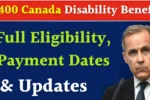US Driving License Rule Changes September 2025: Starting September 2025, the United States Department of Transportation has mandated new nationwide driving license regulations specifically targeting Americans aged 70 and above. These landmark updates were implemented to promote road safety while protecting the independence and dignity of senior citizens. The changes apply across all states, introducing a tiered and evidence-based renewal process to better address age-related risks and abilities.
Why the New Rules Were Introduced
America’s population is aging rapidly, with more than 48 million licensed drivers over the age of 65 projected by 2025. Driving for seniors goes far beyond transportation—it represents autonomy, the ability to access healthcare, social engagement, and daily errands. However, issues such as slower reaction times, deteriorating vision, and cognitive changes prompted regulators to reconsider existing rules, ensuring a fair balance between safety and independence.
Key Changes in Driving License Rules for Seniors
From September 2025, the federal government requires all states to observe new, tiered renewal periods and mandatory assessments for senior drivers. Previous uniform procedures have been replaced by age-specific schedules and tests.
- Renewal periods now vary by age group
- Mandatory vision screenings and reaction time tests
- Cognitive tests and in-person road tests for the oldest age bracket
- Possible driving restrictions for those with proven limitations
Main Features of the Federal Rules
- Tiered renewal periods: Renewal intervals differ for ages 70–79, 80–86, and 87+.
- Mandatory health & cognitive assessments: All drivers in affected ages must submit to vision or cognitive checks based on age and individual health reports.
- Increased scrutiny for mobility risks: Annual road tests required for drivers aged 87 and above to ensure continuing safe physical operation of a vehicle.
- Introduction of restricted licenses: When recommended, certain seniors will receive limited licenses to ensure safety while maintaining access to essential activities.
Table: Age-Based Renewal Process
| Age Group | Renewal Frequency | Required Tests/Checks |
|---|---|---|
| 70–79 | Every 4 years | In-person or telehealth vision test |
| 80–86 | Every 2 years | Vision + reaction time/cognitive test |
| 87+ | Annually | Full in-person road + eye test |
Table: State-by-State Policy Differences
| State | Online Renewal | Road Test Policy | Eye Test Requirement |
|---|---|---|---|
| California | No | Required after age 70 | Age 70 |
| Florida | Yes | Mandatory from age 80 | Age 80 |
| Illinois | No | Required from age 87 | Age 79 |
| Texas | No | DMV discretion | All ages as needed |
While the federal mandate sets the foundation, states retain some flexibility in execution. Telehealth assessments and waivers for defensive driving course completions are examples of state-specific adaptations.
New Assessment Types
Vision Screening
All renewals now require an official vision check. This process uncovers serious issues such as cataracts, glaucoma, or impaired night vision. Seniors are expected to wear corrective lenses during assessment if prescribed. Detecting and treating vision problems helps minimize risks for both the driver and others.
Cognitive Testing
Drivers suspected of confusion, memory problems, or diagnosed with conditions such as dementia or post-stroke impairments will undergo basic cognitive screening. These tests observe reaction times and decision-making to ensure safe driving abilities persist.
Behind-the-Wheel Road Test
Drivers aged 87 and above must now take an annual practical driving test. These sessions reveal physical mobility or judgment issues that may impact accident risk. If the senior passes, their license is retained—if not, specific restrictions or non-renewal may apply.
Reporting Unsafe Senior Drivers
The law now includes a clear mechanism for doctors, family members, or concerned citizens to confidentially submit a report to the DMV about drivers suspected of unsafe operation due to health or cognitive decline. The DMV then calls the driver for reassessment to maintain community safety without blanket age bans.
Restricted Senior Licenses
Not all failing assessments result in a wholesale loss of driving privileges. Many states may apply a restricted license, permitting essential driving but limiting riskier activities:
- Daylight-only driving
- No highway access
- Area or distance restrictions
This allows seniors to retain independence for daily activities, even if declined for specific road types or times.
Alternatives to Driving: Keeping Independence
When a senior can no longer safely drive, multiple accessible alternatives are available:
- Discounted taxi, Uber, or Lyft rides for seniors
- Free or reduced-rate public transportation passes
- Community shuttle vans
- Specialized rural ride voucher programs
Transitioning is made easier with these programs, ensuring that essential appointments and activities remain within reach.
Preparing for Renewal: Senior Checklist
To make renewal smooth and stress-free, seniors are encouraged to:
- Receive an eye exam at least 90 days before renewal
- Gather updated medical records from neurologists, cardiologists, and eye specialists if needed
- Review local DMV rules; each state may adjust procedures for tests or documents
- Consider defensive driving or refresher courses (especially if recommended by their physician); some states will waive certain test requirements for completion
- Consult family members or caregivers as needed for transportation planning
Impact and Goals of the Federal Law
The September 2025 changes are designed to prevent accidents, not penalize seniors simply for aging. By introducing tiered renewals, thorough testing, and flexible restrictions, the law aims to:
- Assess a senior’s driving ability fairly
- Reduce risk for all road users
- Maintain autonomy for older Americans for as long as it is safely possible
FAQs: US Driving License Rule Changes for Seniors 70+
1. When does the new senior driving law begin?
The updated law starts nationwide between July and September 2025, covering all drivers aged 70 and older.
2. Will seniors age 70+ need to take annual road tests?
No. Annual road tests are required only for drivers aged 87 and above. Other assessments vary by age bracket.
3. Who can report an unsafe senior driver to the DMV?
Doctors, family members, and concerned citizens can submit confidential reports if a driver’s ability seems impaired. The DMV may then reassess the driver.
4. Will seniors automatically lose their licenses at a certain age?
No. Only drivers who cannot pass required assessments or road tests may lose their licenses or face special restrictions. There is no blanket age ban.
5. What are the main alternatives for seniors who cannot renew?
Options include discounted rideshare, public transit passes, senior shuttle vans, and rural ride voucher systems to support ongoing mobility.
Conclusion
The September 2025 US driving license rule changes mark a major step in balancing independence and safety for senior drivers. By shifting from a uniform system to tiered renewal frequencies, mandatory vision and cognitive testing, and the introduction of restricted licenses, the law empowers older Americans to keep driving when safe and protects everyone on the road. Seniors, their families, and communities alike should prepare for the new rules, capitalize on support programs, and embrace the continued opportunity to live mobile, independent lives.












